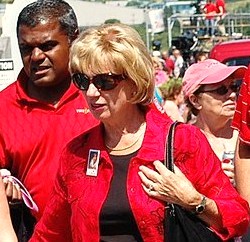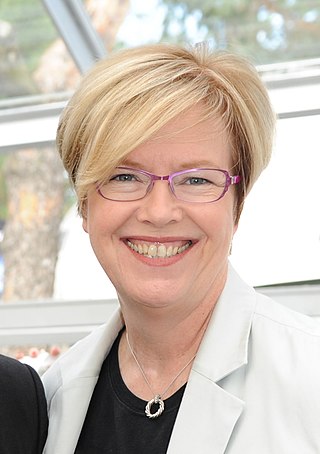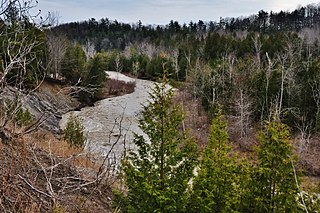Related Research Articles

The Frederick G. Gardiner Expressway, commonly known as the Gardiner Expressway or simply the Gardiner, is a partially at grade and elevated municipal expressway in Toronto, Ontario, Canada. Running close to the shore of Lake Ontario, it extends from the foot of the Don Valley Parkway (DVP) in the east, just past the mouth of the Don River, to the junction of Highway 427 and the Queen Elizabeth Way (QEW) in the west, for a total length of 18.0 kilometres (11.2 mi). East of Dufferin Street to just east of the Don River, the roadway is elevated for a length of 6.8 kilometres (4.2 mi), unofficially making it the longest bridge in Ontario.

The Don River is a watercourse in southern Ontario that empties into Lake Ontario, at Toronto Harbour. Its mouth was just east of the street grid of the town of York, Upper Canada, the municipality that evolved into Toronto, Ontario. The Don is one of the major watercourses draining Toronto that have headwaters in the Oak Ridges Moraine.
The Don Valley Parkway (DVP) is a municipal expressway in Toronto, Ontario, Canada, which connects the Gardiner Expressway in downtown Toronto with Highway 401. North of Highway 401, it continues as Highway 404. The parkway runs through the parklands of the Don River valley, after which it is named. It has a maximum speed limit of 90 km/h (56 mph) for its entire length of 15.0 km (9.3 mi). It is six lanes for most of its length, with eight lanes north of York Mills Road and four lanes south of Eastern Avenue. As a municipal road, it is patrolled by the Toronto Police Service.

Judith A. Sgro is a Canadian politician. A member of the Liberal Party of Canada, she currently represents the electoral district of Humber River—Black Creek in the House of Commons of Canada. Sgro currently serves as the chair of the Standing Committee on International Trade and as a Chair on the Canadian House of Commons Liaison Committee since 2016.
Sarmite Drosma "Sam" Bulte, is a Canadian lawyer, advocate and politician. A member of the Liberal Party, she represented the Toronto riding of Parkdale-High Park in the House of Commons of Canada through three successive parliaments from June 2, 1997 to January 22, 2006. Bulte was the first Canadian of Latvian heritage to take a seat in Parliament.

Shelley Carroll is a Canadian politician who has served on Toronto City Council since 2003. Carroll has been the chair of the Budget Committee since 2023 and represents Ward 17 Don Valley North.

Riverdale Park is a large park spanning the Lower Don River in Toronto, Ontario, Canada, between Cabbagetown to the west and Broadview Avenue in Riverdale to the east.

John L. Parker is a politician in Ontario, Canada. He was a Progressive Conservative member of the Legislative Assembly of Ontario for York East from 1995 to 1999. From 2006 to 2014 he was a Toronto city councillor for Ward 26, which includes the neighbourhoods of Leaside and Flemingdon Park. From 2010 to 2014 he was appointed as Deputy Speaker.

The Toronto Works and Emergency Services department was responsible for a variety of services.

Rob Davis is a Canadian politician. He served on the City of York council from 1991 to 1997. He was the first Black city councillor in the 200-year history of the City of York. He was elected as a member of the amalgamated Toronto City Council from 1997 to 2000. He was also the first Black city councillor of the amalgamated Toronto City Council. In 2023, Davis unsuccessfully ran for mayor of Toronto in a by-election called as a result of the resignation of Mayor John Tory. Davis told the media that Torontonians no longer felt safe on the TTC, were struggling with the high cost of housing, and thought the council was wasting taxpayer's money on changing the name Dundas instead of helping the homeless and people who are less fortunate. Davis vowed to make Toronto safer, cleaner, and kinder.

The Keating Channel is a 1,000-metre (3,300 ft) long waterway in Toronto, Ontario, Canada. It connects the Don River to inner Toronto Harbour on Lake Ontario. The channel is named after Edward Henry Keating (1844-1912), a city engineer (1892-1898) who proposed the creation of the channel in 1893. The channel was built to connect Ashbridge's Bay to the harbour; later, the Don was diverted into the channel, and its river mouth infilled in the early 1910s.
Friends of the Don East (FODE) is a non-governmental organization based in Toronto, Ontario, Canada. They are an environmental group whose goal is to preserve and protect natural areas in the Don River watershed.

Daylighting is the opening up and restoration of a previously buried watercourse, one which had at some point been diverted below ground. Typically, the rationale behind returning the riparian environment of a stream, wash, or river to a more natural above-ground state is to reduce runoff, create habitat for species in need of it, or improve an area's aesthetics. In the United Kingdom, the practice is also known as deculverting.

Crothers Woods is an area of the Don River valley in Toronto, Ontario, Canada. It is 52 hectares in size and consists of woodland, meadows, wetlands, and an assortment of past and present municipal uses. The wooded area has been designated as an Environmentally Significant Area (ESA) by the Toronto and Region Conservation Authority. An ESA designation is useful in highlighting valuable natural areas but this does not affect planning uses. The area is currently zoned as undeveloped parkland. Crothers Woods was named after George W. Crothers who owned and operated an equipment dealership called Crothers Caterpillar which sold and serviced new and used heavy machinery for the construction and mining industries. The company stayed until 1979 when they relocated to Vaughan, Ontario. Murhal Developments bought the property and eventually sold it to Loblaws which built the store that currently occupies the site just off Millwood Road.

The Toronto ravine system is a distinctive feature of the city's geography, consisting of a network of deep ravines, which forms a large urban forest that runs through most of Toronto. The ravine system is the largest in any city in the world, with the Ravine and Natural Feature Protection Bylaw protecting approximately 110 square kilometres (42 sq mi) of public and privately-owned land. The ravine system has been presented as a central characteristic of the city, with the size of the ravine system leading Toronto to be described as "a city within a park".

Fountain Creek is a creek that originates in Woodland Park in Teller County and flows through El Paso County to its confluence with the Arkansas River near Pueblo in Pueblo County, Colorado. The 74.5-mile-long (119.9 km) creek, once known as the Fontaine qui Bouille, is a tributary of the Arkansas River.

Janet Joy "Jaye" Robinson was a Canadian politician who served as a member of the Toronto City Council from 2010 to 2024. She was the chair of the Toronto Transit Commission (TTC) from 2018 to 2022. Robinson represented Ward 15 Don Valley West. She died in office on May 16, 2024.
The Gulf Coast Ecosystem Restoration Task Force is the organization created by President Barack Obama to recover from the 2010 BP Deepwater Horizon oil spill and preserve the ecosystem of the Gulf Coast of the United States.

Tibbetts Brook, originally Tippett's Brook or Tibbitt's Brook, is a stream in the southern portion of mainland New York, flowing north to south from the city of Yonkers in Westchester County into the borough of the Bronx within New York City. Originally emptying into Spuyten Duyvil Creek as part of the Harlem River system, the stream is now partially subterranean, ending above ground at the south end of Van Cortlandt Lake within Van Cortlandt Park. There it proceeds into city sewers, draining into either the northern end of the Harlem River or the Wards Island Water Pollution Control Plant. The brook provides significant watershed to both Van Cortlandt Park at its south end and Tibbetts Brook Park at its north end. There have been modern proposals to daylight the southern portion of the brook back onto the surface.

Mud Creek is a mostly buried south-easterly tributary of the Don River in Toronto, Ontario, Canada. It has also been known at different times as Mount Pleasant Brook and Spring Valley Creek.
References
- ↑ "Frequently asked questions about the Don River". City of Toronto. Archived from the original on June 7, 2011.
- ↑ "Rebirth of a River" (PDF). City of Toronto. Archived from the original (PDF) on June 7, 2011.
- ↑ "Chester Springs Marsh: Creating Wetlands". Hoyle Ltd. Landscape Architects. Archived from the original on April 23, 2009.
- ↑ "Wetlands are the best Lands". Archived from the original on June 7, 2011.
- ↑ "Chapter 681: Sewers" (PDF). City of Toronto. Archived from the original (PDF) on June 7, 2011.
- ↑ "Wet Weather Flow Management Guidelines". City of Toronto. 2003.
- ↑ "Waterfront news releases". City of Toronto. Archived from the original on June 7, 2011.
Further reading
- Bringing Back the Don. 1991. Task Force to Bring Back the Don. City of Toronto.
- Lower Don River Valley demonstration habitat wetland: environmental study report. 1995. Harrington and Hoyle.
- Selected bibliography at Urban Affairs Library, Metro Hall (archived)